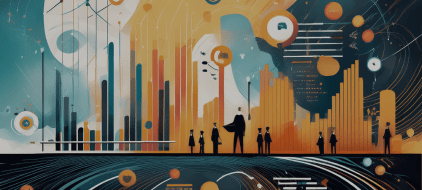In today’s rapidly evolving business landscape, attracting and retaining top talent has become a critical competitive advantage. However, the recruitment process—often plagued by inefficiencies, biases, and manual grunt work—has long been due for disruption. Enter artificial intelligence (AI): the game-changer that's transforming talent acquisition into a streamlined, data-driven, and highly strategic endeavor.
This article explores the profound ways AI is revolutionizing recruitment, empowering HR professionals to focus on what matters most—building human connections and driving organizational growth.
The State of Recruitment Today
The recruitment process often involves sifting through an overwhelming number of resumes, coordinating countless interviews, and navigating the complexities of candidate assessments. According to LinkedIn’s Global Talent Trends report, 67% of recruiters say finding the right candidate is their biggest challenge.
Add to this the risks of unconscious bias, inconsistent evaluation criteria, and time-to-hire delays, and it becomes clear why traditional methods are losing their edge in a fast-paced, digital-first world.
AI is not just addressing these challenges—it’s rewriting the rulebook altogether.
How AI is Transforming the Talent Acquisition Lifecycle
Resume Screening and Shortlisting
One of AI’s earliest contributions to recruitment has been in the area of resume parsing. Instead of HR teams manually reviewing hundreds of resumes, AI-powered applicant tracking systems (ATS) can:
- Automate Resume Screening: By analyzing resumes against job descriptions, AI identifies candidates with the closest matches to required skills, experience, and qualifications.
- Rank Candidates: AI tools can rank candidates based on relevancy, ensuring recruiters focus on top-tier talent.
- Reduce Bias: By anonymizing candidate details (e.g., names, photos, gender), AI helps reduce unconscious bias during the initial screening phase.
For example, platforms like HireVue and Pymetrics leverage AI to analyze resumes, video interviews, and behavioral data, ensuring a faster and more equitable recruitment process.
Candidate Sourcing
AI-driven sourcing tools like LinkedIn Recruiter, Entelo, and SeekOut allow companies to proactively identify and engage passive candidates. These tools can:
- Scour public profiles, forums, and online communities to identify professionals with specific skills.
- Predict a candidate’s likelihood of switching jobs based on their career trajectory.
- Personalize outreach campaigns, increasing the chances of candidate engagement.
AI-Powered Job Descriptions
Crafting a compelling and inclusive job description is both an art and a science. AI tools such as Textio and Ongig assist in optimizing job postings by:
- Highlighting language that may unintentionally discourage certain groups (e.g., gender-coded words).
- Suggesting alternative phrasing to improve inclusivity and appeal.
- Ensuring SEO-optimized content for better visibility on job boards.
Predictive Analytics for Talent Acquisition
AI doesn’t just help find talent—it predicts which candidates are most likely to succeed in a specific role. By analyzing historical hiring data, performance metrics, and team dynamics, AI tools provide insights into:
- Which candidate profiles align best with company culture.
- The probability of a candidate thriving long-term in a given role.
- Which roles are at higher risk of attrition and why.
Interview Optimization
AI is enhancing interviews in several ways:
- Scheduling: AI tools like Calendly automate interview scheduling, saving time and eliminating back-and-forth emails.
- Virtual Interviews: Platforms like HireVue use AI to analyze candidate responses, tone, and body language during video interviews.
- Feedback Analysis: AI helps standardize interview feedback by providing structured templates and eliminating subjective biases.
The Benefits of AI in Recruitment
AI’s integration into recruitment offers numerous advantages:
- Efficiency: Automating repetitive tasks allows HR teams to focus on strategic initiatives.
- Scalability: AI enables companies to handle high volumes of applications without compromising quality.
- Diversity and Inclusion: By mitigating unconscious bias, AI promotes a more equitable hiring process.
- Cost Reduction: Faster hiring cycles and improved candidate matching reduce recruitment costs.
- Candidate Experience: AI chatbots and tailored communications enhance the candidate journey.
Challenges and Ethical Considerations
While AI offers transformative potential, it’s not without challenges:
- Bias in AI Models: If the training data used to develop AI tools contains bias, the outcomes may reinforce rather than reduce it.
- Privacy Concerns: AI tools must comply with data protection regulations (e.g., GDPR) to ensure candidate information is handled responsibly.
- Over-Reliance on Technology: While AI can assist decision-making, the human element in recruitment remains irreplaceable.
Organizations must implement AI responsibly, ensuring transparency, fairness, and accountability in their hiring practices.
Real-World Success Stories
- Unilever: By integrating AI into its recruitment strategy, Unilever reduced its time-to-hire by 75%, improved candidate quality, and enhanced the diversity of its hires.
- IBM: IBM’s Watson Recruitment uses AI to analyze hiring patterns and predict future talent needs, helping the company maintain a competitive edge.
- Hilton: Hilton adopted AI-powered chatbots to engage candidates, resulting in higher application completion rates and a smoother recruitment process.
The Future of AI in Recruitment
The future of talent acquisition is intertwined with AI advancements. Emerging trends include:
- Hyper-Personalization: Tailoring recruitment strategies to individual candidates based on their preferences and career goals.
- AI-Driven Upskilling: Using AI to identify skills gaps and recommend learning paths for existing employees.
- Global Reach: AI tools breaking geographical barriers to source talent from diverse markets.
As AI continues to evolve, its role in recruitment will become even more indispensable, empowering organizations to build high-performing teams with precision and speed.
Conclusion
The recruitment industry is at a crossroads, with AI leading the charge toward a smarter, faster, and fairer future. By embracing AI-powered tools and strategies, companies can unlock unprecedented efficiencies, attract top talent, and stay ahead in a hyper-competitive landscape.
As AI transforms the talent acquisition lifecycle, the focus shifts from simply filling positions to building dynamic, future-ready teams that drive innovation and success.
It’s not just about recruiting for today—it’s about preparing for tomorrow. Are you ready to join the revolution?








